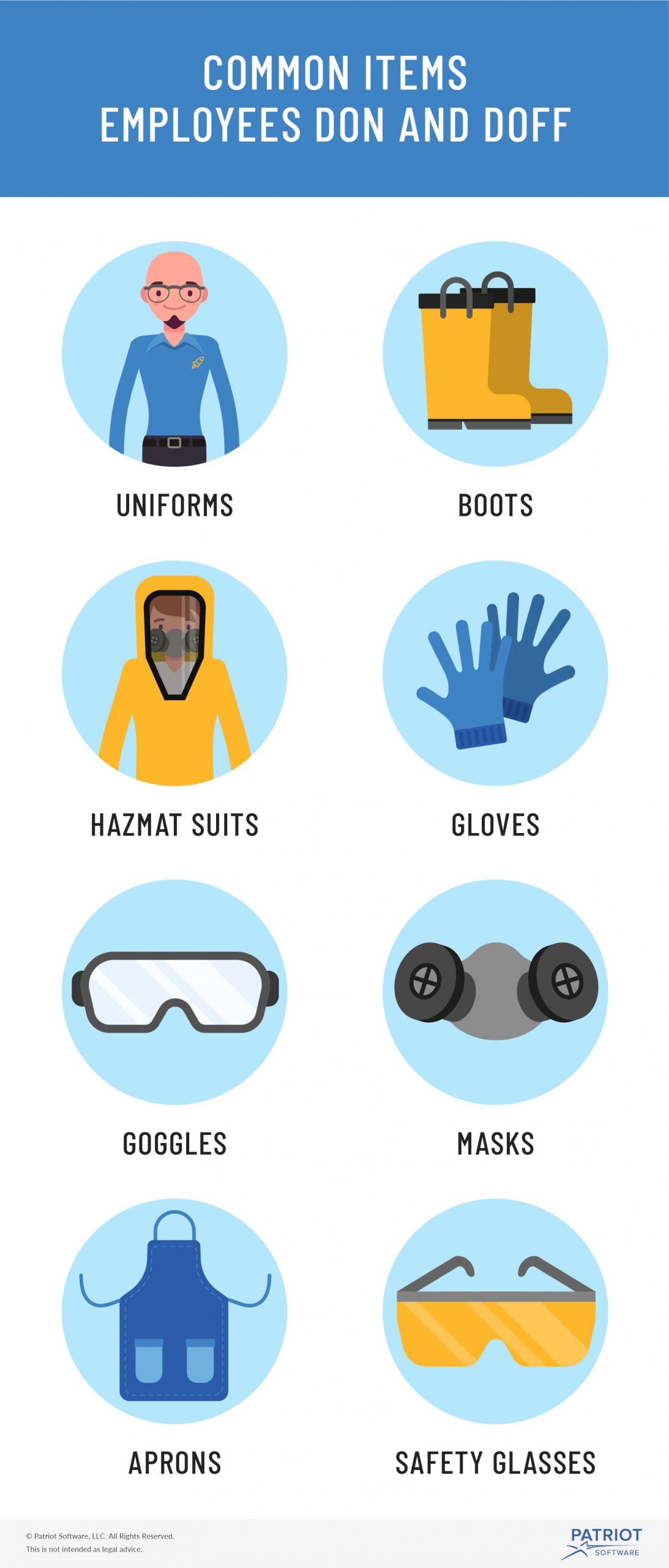Depending on the type of business and work environment, employers might require employees to wear uniforms or protective gear. To follow federal and state laws, employers must know the regulations of employees putting on and taking off work-related gear and clothing, otherwise known as donning and doffing.
Learn more about what is donning and doffing, common types of businesses that require it, and whether the business is obligated to pay employees while they are donning and doffing.
What is donning and doffing?
Donning and doffing is the practice of employees putting on and removing work-related protective gear, clothing, and uniforms. Donning refers to putting on work clothes, gear, and equipment, while doffing means removing them.
Businesses that typically require specific attire for workers have employees who don and doff. Police officers, nurses, and security guards are just a few examples of workers who wear uniforms to perform work duties.
Generally, uniforms and other clothing worn by employees while donning and doffing includes protective gear. For example, firefighters wear fire resistant jackets, trousers, and boots to stay protected from flames.
Employee compensation laws for donning and doffing
Compensating your employees for donning and doffing depends on your type of business, company policies, and whether or not you have an agreement or contract. Check out laws pertaining to employee compensation for donning and doffing below.
Determining preliminary vs. postliminary activities
Before you can determine if donning and doffing is compensable, you must understand preliminary vs. postliminary activities.
Preliminary activities include activities done before an employee begins their principal work activities. On the other hand, an employee’s postliminary activities include tasks done after principal work activities are completed. Employees’ principal work activities include what employees are responsible for during work.
During preliminary and postliminary activities, employees may be required to don and doff clothing. If so, employers can choose to compensate employees for time spent donning or doffing outside of principal work activities.
Integral activities
Typically, unless the donning and doffing is considered an integral part of an employee’s job, you do not have to compensate them.
Integral parts of a job include necessary activities to perform job duties. For example, if an employee must wear a hazmat suit to complete work-related assignments and duties, they are required to don and doff gear and clothing.
As an employer, you determine if donning and doffing is an integral part of an employee’s job. If you do consider it to be an integral activity, compensate the employee for time spent donning and doffing.
FLSA
The Fair Labors Standards Act (FLSA) guidelines for donning and doffing have varied throughout the years. Initially, the FLSA required mandatory pay for any employee donning and doffing.
In recent years, the Department of Labor determined that donning and doffing is considered “changing clothes.” FLSA regulations allow employers to exclude time spent changing clothes from being considered compensable work.
Ultimately, an employer can determine whether or not to compensate an employee for donning and doffing.
You can review the FLSA’s donning and doffing regulations on the Department of Labor website.
Portal-to-Portal Act
The Portal-to-Portal Act is an amendment to the FLSA that specifies whether or not time spent doing preliminary or postliminary activities is considered compensable work. The Portal-to-Portal Act clarified that certain activities, such as donning and doffing, are not compensable working time.
The Portal-to-Portal Act specifies that employers are not required to pay employees for time spent on preliminary or postliminary activities (e.g., traveling to or from work).
Under the Portal-to-Portal Act, compensable workdays consist of principal work activities including:
- Duties performed as part of a regular work day
- Activities that are an integral part of or are indispensable to employees’ regular duties
Even though the Portal-to-Portal Act determines most time donning and doffing is uncompensable, the Supreme Court interprets the Portal-to-Portal Act to require compensation for time spent on integral and indispensable to the employee’s principal activities. So, in some cases, employers may be required to pay employees while donning and doffing.
For example, when an employee changes their clothes before or after work, it is not typically considered compensable working time. However, say an employee’s job involves toxic materials and they are required to change into a hazmat suit for work. Since the employee must wear the suit for protection to perform their job, the employer must compensate the employee since the donning and doffing is an integral and indispensable part of their job.
Summary of donning and doffing laws
In most cases, employers can opt not to pay employees for donning and doffing. However, there are a few exceptions.
As a brief review, employers can choose to compensate employees for donning and doffing unless:
- Time is considered hours worked according to an employment contract (e.g., collective bargaining agreement or union contract)
- Employer treats the time as hours worked according to the business’s rules or handbook
- It’s an integral part of the employee’s job
=========
This article first appeared on the Patriot Software blog.
Thanks for reading CPA Practice Advisor!
Subscribe Already registered? Log In
Need more information? Read the FAQs




